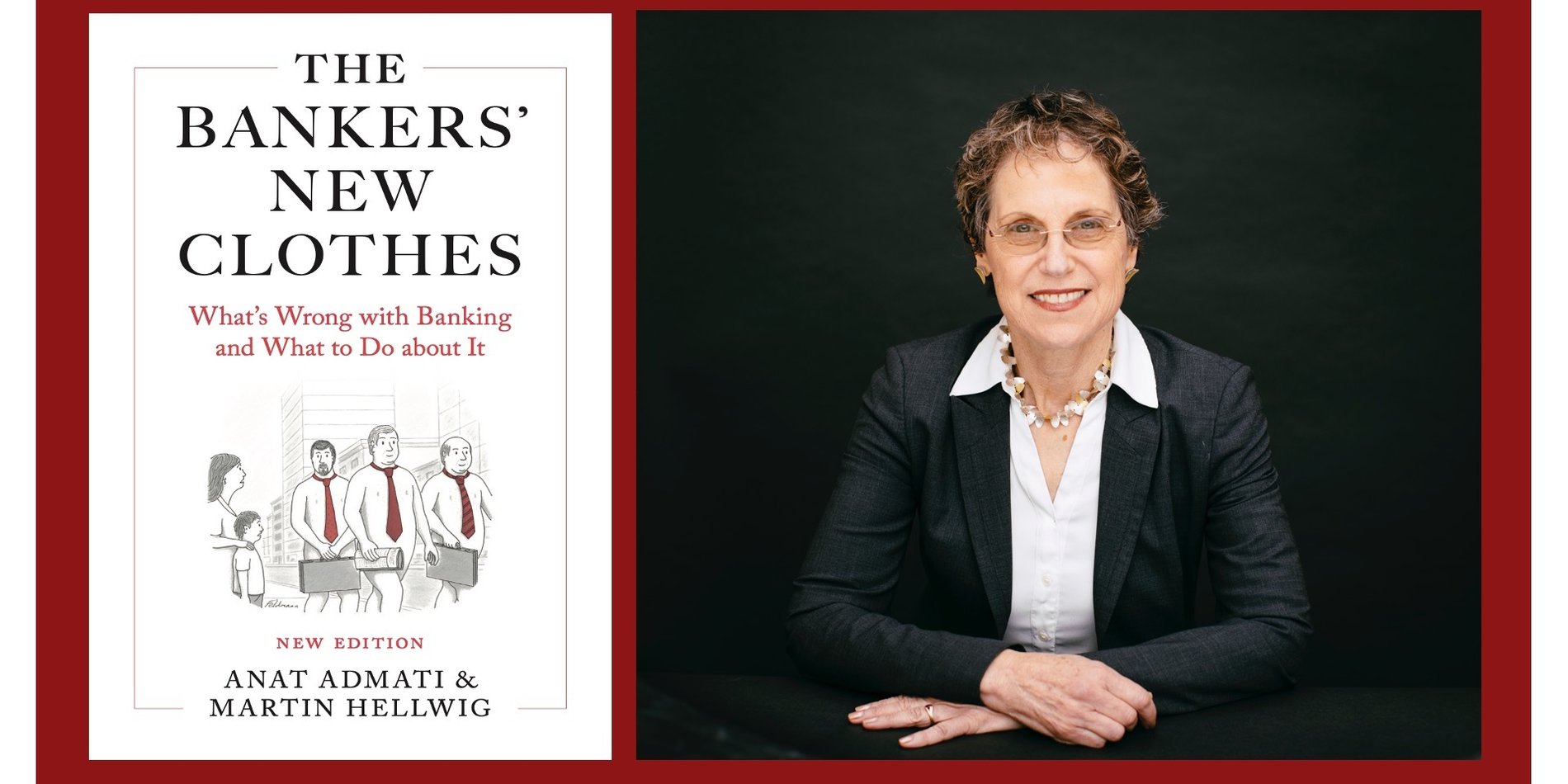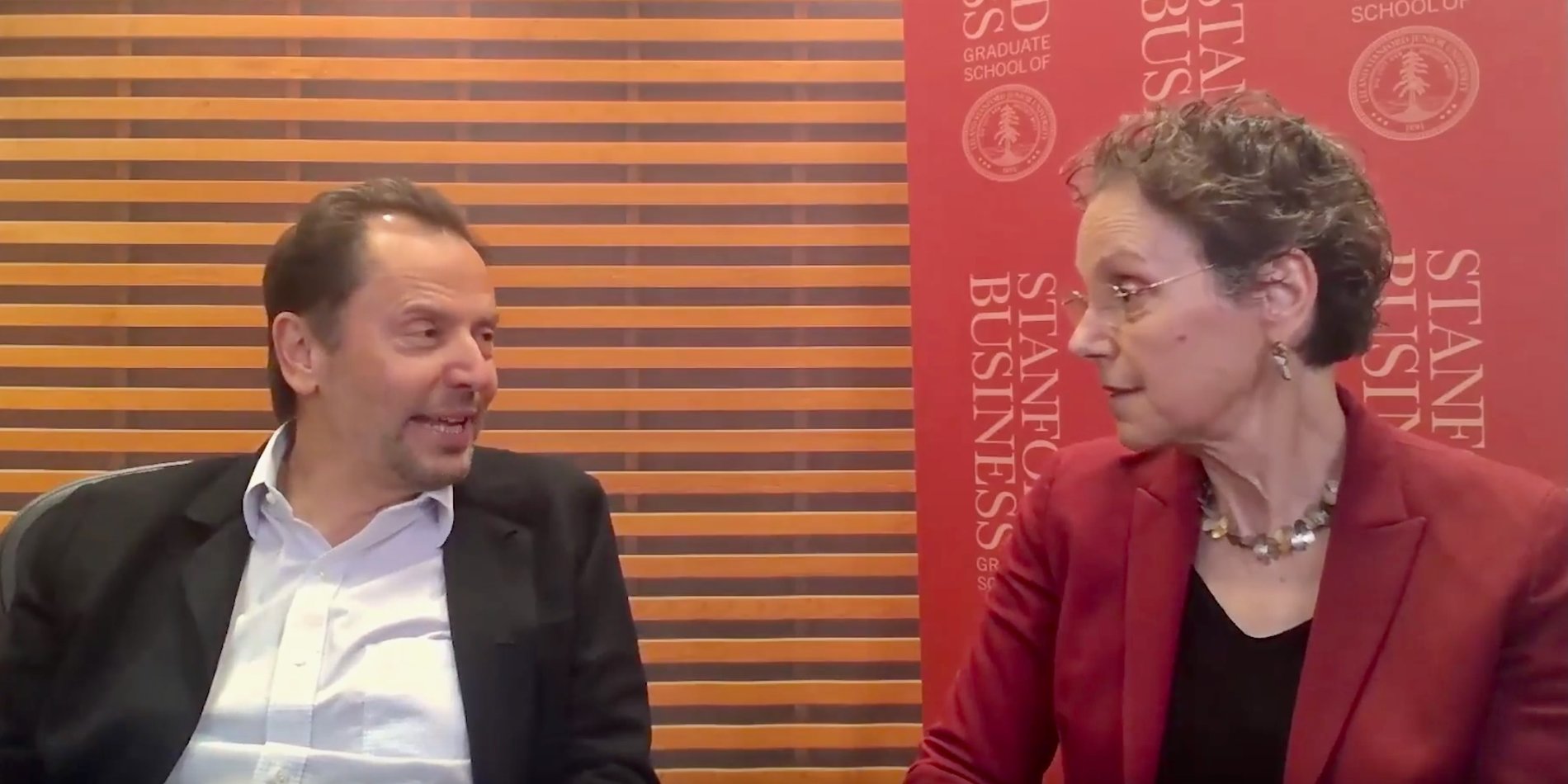Power and Politics in Banking
The Financial Crisis of 2007-2008 brought the connections between banking, power, and politics into sharp focus, revealing the deep relationships between the nation's largest banks and the halls of power in Washington. In the spring of 2023, the collapse of Silicon Valley Bank, Signature Bank, and First Republic reopened debates about financial stability and the failures of regulatory oversight, and has led to calls for more reform.
On January 16, Kevin Warsh, former governor of the US Federal Reserve, and Anat Admati, CASI faculty director, examined these issues at a CASI-hosted event at Stanford Graduate School of Business. The discussion was moderated by GSB professor of finance and Senior Associate Dean for Academic Affairs Amit Seru.
After a brief introduction of the panel by CASI student leader Jianmin Wu, Seru asked Admati what sparked her interest in political and regulatory issues around the banking industry. He noted that the new and expanded version of her book, The Bankers’ New Clothes: What’s Wrong with Banking and What to Do about It, with co-author Martin Hellwig, has a significant emphasis on politics.
Admati explained that while the book was written to teach the public about the economics of banking, in the decade since its publication, it became very clear that “what we were seeing could not be understood from the field of economics alone. It's not just political science, it's social psychology, it’s sociology, it’s a lot of fields that play out in why we are here.”
Admati told the audience that her interest in the subject emerged with the 2007-2008 financial crisis. She characterized her exploration of banking as falling into a rabbit hole, driven by a need to comprehend the complexities of the financial world and the role of politics within it. Her experience teaching corporate finance for decades led her to question the assumptions of the field and uncover the political nuances that had been overlooked.
“All of a sudden, I was in a world in which I didn't understand what people knew. I didn't understand why people were saying what they were saying. And why they were having an impact where they shouldn't. And that was where the politics came in.”
Seru asked Kevin Warsh for his perspective on how politics influenced the policies during the 2008 financial crisis. Warsh, with a background in banking and law, emphasized that the interplay of power and politics in the context of economics should be viewed as a response to government policies and incentives rather than purely partisan politics.
“When we use words like power and politics, another way to think about that is these are rational actors in an ecosystem created by our government policy,” he said. “And they're doing what one would expect them to do given their incentives.”
Warsh reflected on his time at the Federal Reserve during the 2008 crisis and acknowledged that there was a delay in recognizing the severity of the crisis.
“The global banking system was insolvent and the last people who knew were the regulators who were responsible.”
Subsequently, fundamental reforms were implemented to prevent another crisis, but Warsh suggested that these reforms may not have gone far enough.
Seru asked why banks, particularly large ones such as JP Morgan Chase, appear to be thriving with record profits.
Admati explained that banks enjoy significant privileges in the economy, often concealed behind a facade of serving the public good. As an example, she pointed to the Federal Reserve's Bank Term Funding Program (BTFP), which allows banks to borrow at low-interest rates and then earn higher interest rates on reserves, effectively creating easy arbitrage profits.
Admati emphasized that decisions made in banks are almost always driven by the goal of maximizing shareholder value, which means taking advantage of numerous opportunities while relying on safety nets like government deposit insurance and central banks, all of which can undermine financial stability and work against the public good.
It’s a whole system, she said, “and you put in the other ‘enablers’ -- the auditing companies, credit rating agencies, on and on, and you see how they get away with it.”
Seru asked whether the reforms implemented after the financial crisis have been effective, given that banks, especially the large ones, seem stronger and more profitable than ever. Warsh expressed his skepticism regarding the 2008 reforms, stating that he holds an old-fashioned view of regulation and supervision.
“The key controls, the key decisions that they make, it really becomes compliance. Most reforms that were put in place in 2008 struck me then and strike me now as antithetical to what prudential oversight looks like.”
Warsh emphasized three pillars of effective oversight: regulatory discipline, clear and comparable capital standards, and market discipline. He criticized the 2008 reforms for spreading regulatory accountability among multiple overlapping regulators, complicating capital standards, and failing to establish market discipline. He argued that without proper market discipline, banks can take excessive risks with little consequence.
“The world saw that the Federal Reserve and the US government effectively backstopped and bailed out institutions. After we got out of that crisis, we needed to cleanse our hands of that, and say we now have a system where that won't happen again, and it has to be credible.”
Warsh pointed out that another crisis did happen again, in the Spring of 2023, with the collapse of Silicon Valley Bank, Signature Bank, and First Republic. Once again, the Federal Reserve jumped in to guarantee deposits and prevent the crisis from spreading.
“Market discipline can't work if the world sees that there are a few institutions that have privilege status and they see 4,000 other banks that want to compete, that want to get a piece of those profits, but make it very difficult.”
Warsh said he doesn’t see banks making profits as an issue; the problem arises when mistakes are not appropriately penalized, as they would be in other industries.
Seru brought up the idea advanced by some that banks are special and require subsidies due to potential externalities if they fail. This led to questions concerning the level of equity (capital) that banks should have, which is a key part of the current debate on capital reforms. He asked Admati why she thought that academia, which is supposed to resolve such issues through competition of ideas, has not provided a clear answer to this problem.
Admati explained that while some argue that banks are special and operate effectively, markets do not work efficiently when it comes to banks because depositors cannot easily assess the strength or weakness of a bank, leading to the need for deposit insurance. However, this protection has been extended to others who hold liabilities of the banks, which discourages the use of equity funding.
Admati maintained that when banks are profitable due to subsidies, they distort the economy and may lead to an excessive allocation of talent to the banking sector.
As to why many academics tolerate the current situation, Admati said this: “Because many academics want to belong to that crowd that thinks that they're special.”
Warsh added his thoughts about banking’s role in the US economy. He pointed to the fact that the US has historically been an outlier in its approach to banking compared to other major Western economies, which often have a few large banks closely tied to the sovereign.
During the 2007-2008 financial crisis, Warsh said he felt some US regulators were envious of other countries' banking systems that had a few large institutions and a simpler regulatory environment.
“We didn't have conference rooms big enough to invite all the CEOs of 4,000 banks and say, what do you know? Give me your data, let's figure this out.”
Warsh believes that this might have contributed to the migration of assets from smaller banks to larger ones. He shared his concern that small and medium-sized banks, what he considers the core of the American banking system, may now be disadvantaged. He went on to argue that the US should preserve the strengths of its historical banking model rather than adopt a model that diverges from the country's economic traditions.
Seru asked Admati for her perspective on the role of central banks in addressing the most recent financial crisis. He specifically questioned the tendency to label various issues as ‘liquidity problems’ even when the situations don't meet the definition of liquidity.
Admati responded by highlighting that central bankers like to wield power and often resort to liquidity narratives to downplay the severity of problems in the banking system.
“They never want to admit to insolvency problems in banking. They always like to kick the can down the road,” she said. “There's this willful darkness around the system everywhere. People don't want to see risk, people don't want to see problems, It's better to hype, it's better to hope, it's better to glorify than to look at reality, so truth loses out because the truth is inconvenient.”
Seru pointed to the public outrage during the 2007-2008 financial crisis over the bank bailouts and asked Admati why the public is so silent about it now. Admati explained that the issues in banking are somewhat technical and can be confusing to a general audience. She also mentioned that banks often use the threat of not providing loans to intimidate individuals and businesses, further complicating the matter. She said the public needs to be motivated to understand the issues and take action.
Seru’s last question went to Warsh. “So, how do we deal with all this? How do we decouple politics and fix the narrative?”
Warsh rejected the idea that the lack of public outrage meant little attention was being paid to the issues. He suggested that the American people do have a sense that the system isn't working for them, even if they don't fully understand the technical details.
“They know that the long period from the ‘08 crisis till now, which has been popularized mostly by free money, has been very good for those of us that own assets. The stock market has been bid up because the central bank was there with the put. But 52% of our fellow Americans have a balance sheet of zero or negative.”
Warsh argued that the solution lies in returning to the core tenets that made the US economy strong, dynamic, and resilient. “The 21st century can be America's century if we go back to rewarding success and punishing failure, and the business of banking and finance should be no different.”



